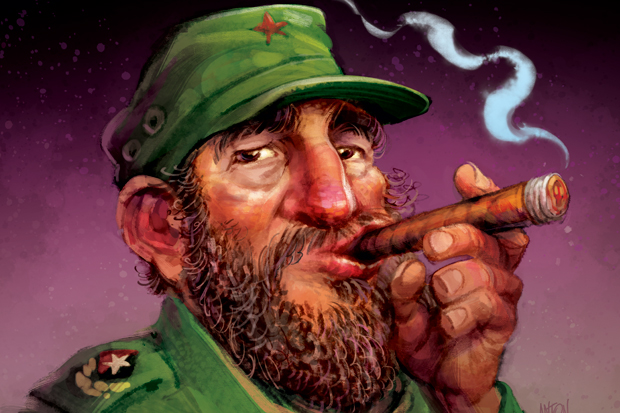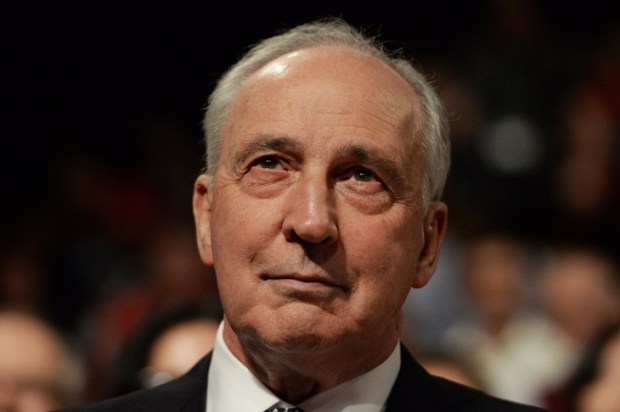It was a warm tropical night in 1995 and Fidel Castro was playing the waiting game with Gareth Evans. The then Australian Foreign Minister wanted to meet Castro and had come to Havana for 24 hours on a wing and a prayer. I was the diplomat organising his visit but the Cubans officials had been coy about when, where or even if the not-so-great dictator would deign to meet the democratically elected representative of the Australian people.
I had been told that an audience might be granted after dinner so Evans and the press pack were whiling away the hours, drinking mojitos on the terrace of the Hotel Nacional where Castro had made time to schmooze more glamorous fellow travellers such as Jean Paul Sartre and Simone de Beauvoir.
Castro made the lesser lights wait. Poor Joey Smallwood, the former premier of Newfoundland, hung around for days for a meeting that never materialised – the humiliation was immortalised in a documentary called Waiting for Fidel.
The Left love Castro and like the Latin lothario he was, Castro returned their adoration with contempt. It was 1.15am when Fidel’s flunkies informed me that Castro was too busy with Olympic tsar Juan Antonio Samaranch to see us; decades later it was alleged that Samaranch became a KGB asset in exchange for Soviet backing for his IOC presidency. Maybe the two were talking shop.
Evans took the snub on the chin. He’d had plenty of practice he said dealing with the Victorian Socialist Left at ALP conferences. The press joked about a Bananas in Pyjamas Republic. But the joke was on the Australian people. The Hawke Labor government had lent the Cubans millions of dollars to buy Australian sugar cane harvesters and the Cubans weren’t even servicing the loan.
Castro liked throwing his weight around. And in 1995 he had more of it than most Cubans. When he’d seized power in 1959, Cuba was one of the richest countries in Latin America, its per capita income higher than Italy, Austria and Japan. It had 6 million head of cattle and grew tobacco, coffee and bananas. By 1962, Castro had so comprehensively destroyed the economy that rationing had to be introduced – ostensibly as a temporary measure. It is still in operation today.
Yet in 1995, even by communist standards the scarcity was dire. Castro called it a ‘special period in a time of peace’, meaning the country was bankrupt. In 1991 when the Soviet Empire collapse under the weight of its monumental inefficiency, Cuba’s sweetheart deal with the USSR crumbled like rotten teeth. Post-perestroika, the Russians announced the honeymoon was over and Castro would have to pay his own way in the world – no more cheap Soviet petrol for overpriced sugar.
Cuba’s GDP dropped by a third and its oil imports by 90 per cent. There was no fuel for factories, fertilizer, harvesters, cars; people walked everywhere in the tropical heat. And there was not enough food – Cubans ate whatever they could find, evens pet cats and peacocks.
You might have thought that reduced to such dire straits Castro would treat Australia, a creditor nation, with a modicum of respect. Hardly – the debts, unserviced, are still on our books. What Castro was looking for was not Gareth Evans but a sugar daddy. And like the answer to a maiden’s prayer, in 1999 in walked Hugo Chavez, ready to bail out his Cuban ‘brother’ with billions of dollars’ worth of cheap oil.
‘Venezuela is traveling towards the same sea as the Cuban people,’ said Chavez prophetically. And sure enough, only a few years later Chavez had bankrupted the Venezuelan economy and another ‘special period in a time of peace’ threatens both countries.
But Castro didn’t care. He blamed the US trade embargo, capitalism, even his central planners. ‘The country had many economists,’ he said, ‘and it is not my intention to criticise them, but I would like to ask why we hadn’t discovered earlier that maintaining our levels of sugar production would be impossible. The Soviet Union had collapsed, oil was costing $40 a barrel, sugar prices were at basement levels… None of our economists seemed to have noticed any of this and we practically had to order them to stop…’
And who was going to disagree with a man who had even his oldest comrade, a decorated ‘hero of the revolution’ no less, executed by firing squad. Human Rights Watch reported more than 7,000 cases of arbitrary detention in just eight months in 2014. Detainees were beaten, threatened or held incommunicado for days. More than a million people fled, and are still fleeing on flotsam and jetsam, risking drowning in shark-infested waters, to escape the workers’ paradise for capitalist ‘exploitation’ in Miami.
You might have thought this would have curbed Evans’ enthusiasm but a stinking human rights record and dismal economic failure weren’t going to stop him ticking the tyrant off his bucket list. And finally, as we were about to depart for the airport, Castro relented. The Cuban Foreign Minister told me to ‘get Gareth’. We piled into official cars and headed out of town on an empty highway for an unspecified destination which turned out to be a desolate convention centre. After sprinting through a labyrinth of dark, echoing corridors we finally found Fidel in a non-descript room with his trademark straggly beard and green army fatigues.
Foolishly, he asked Evans about the Asia Pacific and the man who had bored his way into the Guinness Book of Records with a four-and-a-half-hour speech at the UN had to listen to Evans give chapter and verse on APEC in such detail we almost missed our flight. Castro assured us confidently, however, as only a dictator can, that the plane would go nowhere until he said so. But when it did, Evans was able to leave. Unlike millions of Cubans.
Fidel is dead but his brother Raúl is still running the country, adhering to the principals of socialism in one family and playing the waiting game – with 11 million Cubans who have no idea when they will be allowed to come in from the Cold.
Got something to add? Join the discussion and comment below.
Get 10 issues for just $10
Subscribe to The Spectator Australia today for the next 10 magazine issues, plus full online access, for just $10.
You might disagree with half of it, but you’ll enjoy reading all of it. Try your first month for free, then just $2 a week for the remainder of your first year.














Comments
Don't miss out
Join the conversation with other Spectator Australia readers. Subscribe to leave a comment.
SUBSCRIBEAlready a subscriber? Log in